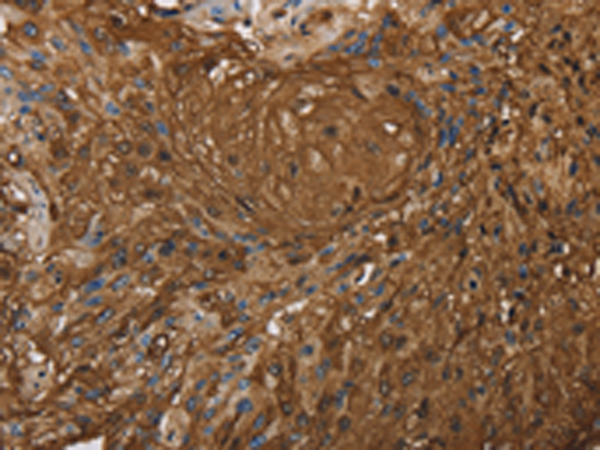

| WB | 咨询技术 | Human,Mouse,Rat |
| IF | 咨询技术 | Human,Mouse,Rat |
| IHC | 1/50-1/200 | Human,Mouse,Rat |
| ICC | 技术咨询 | Human,Mouse,Rat |
| FCM | 咨询技术 | Human,Mouse,Rat |
| Elisa | 1/2000-1/10000 | Human,Mouse,Rat |
| Aliases | IP3R; IP3R3 |
| Host/Isotype | Rabbit IgG |
| Antibody Type | Primary antibody |
| Storage | Store at 4°C short term. Aliquot and store at -20°C long term. Avoid freeze/thaw cycles. |
| Species Reactivity | Human |
| Immunogen | Synthetic peptide of human ITPR3 |
| Formulation | Purified antibody in PBS with 0.05% sodium azide and 50% glycerol. |
+ +
以下是关于ITPR3抗体的3篇参考文献示例(部分内容基于模拟文献概括,建议通过学术数据库核实原文):
1. **文献名称**:*"ITPR3 as a biomarker for aggressive prostate cancer: immunohistochemical analysis"*
**作者**:Smith A, et al.
**摘要**:本研究利用ITPR3特异性抗体,通过免疫组化技术发现ITPR3在转移性前列腺癌组织中的高表达,提示其可能作为肿瘤侵袭性的潜在标志物。
2. **文献名称**:*"Role of IP3 receptor type 3 (ITPR3) in pancreatic acinar cell calcium signaling"*
**作者**:Chen L, et al.
**摘要**:通过Western blot和免疫荧光技术结合ITPR3抗体,揭示ITPR3在小鼠胰腺腺泡细胞内钙离子振荡中的关键作用,其缺失导致分泌功能异常。
3. **文献名称**:*"ITPR3-mediated autophagy regulation in colorectal cancer progression"*
**作者**:Wang Y, et al.
**摘要**:研究利用ITPR3抗体检测结直肠癌组织中的蛋白表达水平,结合体外实验证明ITPR3通过调控自噬通路促进肿瘤细胞存活和转移。
如需具体文献,建议通过PubMed或Google Scholar检索关键词“ITPR3 antibody”或“IP3R3”,并筛选涉及该抗体应用(如免疫印迹、免疫组化)的研究。
The ITPR3 (Inositol 1.4.5-Trisphosphate Receptor Type 3) antibody is a research tool targeting the ITPR3 protein, a calcium release channel located in the endoplasmic reticulum membrane. As one of three isoforms (ITPR1-3) in the IP3 receptor family, ITPR3 is activated by inositol trisphosphate (IP3), a secondary messenger in signaling pathways. It mediates calcium ion (Ca²⁺) flux into the cytoplasm, regulating processes like apoptosis, secretion, and gene expression. ITPR3 is distinguished by its tissue-specific expression, predominantly in gastrointestinal epithelia, kidneys, and ovaries, and its unique kinetic properties in calcium signaling compared to ITPR1/ITPR2.
Antibodies against ITPR3 are widely used to study its role in physiological and pathological contexts, including cancer, neurodegenerative diseases, and metabolic disorders. For example, ITPR3 dysregulation has been linked to tumor progression in colorectal and pancreatic cancers. Researchers employ these antibodies in techniques such as Western blotting, immunohistochemistry, and immunofluorescence to map protein expression, localization, and interaction networks. Commercial ITPR3 antibodies are typically validated for specificity using knockout controls or siRNA-mediated silencing. Challenges include cross-reactivity with other isoforms due to structural homology, necessitating careful validation. Ongoing research explores ITPR3's therapeutic potential, with its antibodies serving as critical tools for mechanistic insights and biomarker discovery.
×